


Select one of the options below:
Gain the in-depth knowledge, critical professional skills, and academic credentials you need to take the next step in your career.
Designed to be completed in as little as one year, this fully online, non-thesis master’s degree program will strengthen your understanding of theoretical and applied aspects of microbiology, immunology, molecular biology and virology, preparing you to pursue career opportunities in a variety of industries.
The Department of Microbiology, Immunology, and Pathology is a world-leader in infectious disease research and education, with robust biomedical research programs focused on understanding fundamental aspects of bacteriology, virology, and prion biology, improving diagnostics for infectious diseases, as well as developing effective treatments and vaccines for globally important infectious diseases, including the SARS-CoV02 coronavirus.
Students who have completed the Microbiology-Immunology Master’s program have successfully obtained positions in a wide range of industries and career paths, including biotechnology, governmental agencies, public health laboratories, academic research labs, as well as moving into terminal degree programs in veterinary and human health. According to the U.S. Bureau of Labor Statistics, employment of microbiologists was projected to grow by three percent between 2019 and 2029. However, considering the massive economic impact of the COVID-19 pandemic, job opportunities will likely expand at a much faster pace as both governments and organizations seek to create better safeguards, diagnostic tools, vaccines, and treatments for future disease outbreaks.
Potential career opportunities for graduates of this program include:
This online program allows you to earn your master's degree from a respected, regionally accredited public research university in Colorado without traveling to a campus. Balance your academic studies with your career, family, and personal obligations.
Although this program is entirely online, you will still have opportunities to interact closely with both your instructors and peers. You will also have access to many of the same resources and services as CSU’s resident students.
Program Total Credits: 30
Recommended for Full-Time Students
| Term | Fall Admission | Spring Admission |
|---|---|---|
| First Semester |
MIP 540 (2 cr.) | MIP 554 (1 cr.) |
| MIP 611 (4 cr.) | MIP 612 (3 cr.) | |
| MIP 613 (4 cr.) | MIP 614 (3 cr.) | |
| MIP 616 (4 cr.) | MIP 617 (3 cr.) | |
| MIP 618A (1 cr.) | MIP 618B (1 cr.) | |
| MIP 619A (2 cr.) | MIP 619A (2 cr.) | |
| = 17 credits | = 13 credits | |
| Second Semester | MIP 554 (1 cr.) | MIP 540 (2 cr.) |
| MIP 612 (3 cr.) | MIP 611 (4 cr.) | |
| MIP 614 (3 cr.) | MIP 613 (4 cr.) | |
| MIP 617 (3 cr.) | MIP 616 (4 cr.) | |
| MIP 618B (1 cr.) | MIP 618A (1 cr.) | |
| MIP 619B (2 cr.) | MIP 619B (2 cr.) | |
| = 13 credits | = 17 credits |
Recommended for Part-Time Students
| Term | Fall Admission | Spring Admission |
|---|---|---|
| First Semester | MIP 611 (4 cr.) MIP 613 (4 cr.) = 8 credits |
MIP 554 (1 cr.) MIP 612 (3 cr.) MIP 614 (3 cr.) = 7 credits |
| Second Semester | MIP 554 (1 cr.) MIP 612 (3 cr.) MIP 614 (3 cr.) = 7 credits |
MIP 611 (4 cr.) MIP 613 (4 cr.) = 8 credits |
| Third Semester | MIP 540 (2 cr.) MIP 616 (4 cr,) MIP 618 A (1 cr.) MIP 619 A (2 cr.) = 9 credits |
MIP 617 (3 cr.) MIP 618 B (1 cr.) MIP 619 A (2 cr.) = 6 credits |
| Fourth Semester | MIP 617 (3 cr.) MIP 618 B (1 cr.) MIP 619 B (2 cr.) = 6 credits |
MIP 540 (2 cr.) MIP 616 (4 cr.) MIP 618 A (1 cr.) MIP 619 B (2 cr.) = 9 credits |
No. There is no required laboratory component to this online program. Students enrolling in this program are not required to have previous laboratory experience. Didactic coursework within this program will explore many different experimental techniques providing foundational knowledge of each technique that will allow you to be more effective in your career.
This program requires Official Transcripts for all post-high school education to be provided with your application. This includes completed and in-progress degrees, community college coursework that was transferred to other institutions, and study abroad coursework. Official Transcripts can be sent through a secure, electronic third party from US institutions (Parchment, eQuals, National Clearinghouse, or similar). Otherwise, paper transcripts can be mailed directly from your institution to CSU. Please visit this page for more information about Official Transcripts.
No, our program does not require the GRE, MCAT, DAT, or other graduate level entrance exam for admission.
Our goal is to keep the program small enough to allow effective instructor interactions and quality learning experiences, while also maintaining a critical mass of students for networking support and overall programmatic impact on the field. We take a holistic approach to our applications and evaluate each one to determine if a student will thrive here. We currently anticipate enrolling up to 100 students per year, but we do not have a set limit on enrollment.
At this time, our program does not offer assistantships, fellowships, or tuition waivers. Please consult the CSU Student Financial Services website for more information of federal student loans and other options that may be available to you.
The program is designed to be completed in one or two academic years (fall and spring semesters).
If you plan on completing the program in one year, we recommend the following course schedule:
If you plan on completing the program in two years, we recommend the following course schedule:
Yes, the program allows students the flexibility to complete courses asynchronously or synchronously over the span of one or two years. Please see the suggested course schedule for the one- or two-year program to help you assess what level of effort will be required. Students are also expected to prepare a scholarly paper as a key requirement for graduation in the final semester of the program.
No. Due to the anticipated volume of applications and the short turn-around time for making decisions, we do not hold interviews for the program.

Director of the Microbiology-Immunology Master’s program, Department of Microbiology, Immunology, and Pathology
I have a strong commitment to graduate education and firmly believe in creating an inclusive environment that promotes individual growth in order to propel each and every student to achieve their professional goals. That is precisely the reason that I conceived and developed the department’s Microbiology-Immunology Master’s Program in 2013. I truly enjoy teaching in this program and seeing students actually achieve what they are capable of both academically and professionally. I believe in presenting and leading in depth discussions on microbiology topics to teach students not only what is known at the cutting edge of the discipline, but also what are the key knowledge gaps that need to be addressed for the future. In other words, I strive to not only deliver a body of knowledge in my sessions, but also to teach why that knowledge is useful and what can be done with it down the road.
Educational Background
Research
My laboratory focuses on RNA – by far the coolest aspect of molecular biology (in my humble opinion anyway…). Specifically, we focus on how the RNA genomes and transcripts of RNA viruses interface with the RNA biology of the infected cell. We are particularly interested in determining the underlying mechanisms for how viral RNAs – which should be recognized as foreign molecules in the cytoplasm and quickly degraded – have evolved to maintain their stability during infection. We also study how cellular RNA processes like splicing, polyadenylation and transcript stability are specifically impacted by viral RNAs and viral infection. Collectively these studies will not only provide insight into a novel area of host-viral interactions, but also may reveal novel avenues for the development of broad-spectrum antiviral therapeutics.
Areas of Interest
Virology, RNA Biology, Post-transcriptional Gene Regulation

Assistant Professor, Department of Microbiology, Immunology, and Pathology
I have been with the Department of Microbiology, Immunology, and Pathology since 2011. Prior to coming to Colorado State University, I was a research scientist at the University of Washington and the toxicology group leader at a contract research organization. More recently, I have taught course-based undergraduate research experience (CURE) laboratory courses, an undergraduate early career preparation in microbiology course, and a graduate-level course for research team mentoring for the Department of Microbiology, Immunology, and Pathology. As a research scientist, I have mentored numerous undergraduate and MS-B students in the laboratory. I enjoy teaching students new laboratory techniques and then watching them blossom into confident, independent researchers. My goal is to prepare students for a fulfilling career so that they can successfully embark on their scientific journey.
Educational Background
Research
I am a research scientist located at the Infectious Disease Research Center at the Foothills campus at Colorado State University. I am interested in studying the regulatory role of the secondary messenger, cyclic di-GMP, in the regulation of pathogenesis and biofilm formation in the select agent Burkholderia pseudomallei. The secretion of uncharacterized polysaccharides and cryptic molecules is also of key interest to our laboratory group. More recently, we have isolated and characterized bacterial endosymbionts from Aedes aegypti mosquitoes and the biting midge (Culicoides sonorensis) with the goal of identifying suitable bacterial candidates for developing paratransgenesis approaches to reduce viral replication.
Areas of Interest
Biofilms, Bacterial Genetics, Cyclic Di-GMP, Polysaccharides, Bacterial Endosymbionts

Associate Department Head of Graduate Education
Professor, Department of Microbiology, Immunology, and Pathology
Faculty, School of Biomedical Engineering
I have been with the Microbiology-Immunology Master’s Program since it began in 2013, and I’ve thoroughly enjoyed my interactions with the students both while they are in the program as well as after they’ve graduated and gone on to successful careers. I greatly enjoy discussing cutting-edge technologies and current issues in microbiology and health that affect our society with my students, mentoring students to help them obtain fulfilling careers, and challenging students to become effective advocates for science in the wider community.
Educational Background
My research group’s focus, as part of the CSU Center for Vector-Borne Infectious Diseases (CVID), is understanding how RNA viruses (such as dengue and SARS-CoV-2) replicate at the molecular and biochemical levels in order to develop novel strategies for the prevention and treatment of viral diseases. We are also interested in developing novel virus-based tools that can be used by the wider scientific community. We use a wide range of tools (classical virology, molecular biology, cell biology, biochemistry, engineering, computational biology, etc.) to understand how these important human pathogens replicate to help identify new strategies to treat and prevent infection and help improve human and animal health.
Areas of Interest
Virology, RNA Biology, Antiviral Drug Discovery, Viral Biochemistry, Diagnostics Development

Professor, Department of Microbiology, Immunology and Pathology
I’ve taught in the Microbiology-Immunology Master’s program since its inauguration in 2013. I enjoy opening the eyes of future professionals to the wonders of immunology and teaching students how to navigate complicated networks operating within the immune system. I feel highly rewarded seeing students moving on in their careers and their lives. This program has demonstrated to advance professional frontiers and opportunities of students, and for this reason I look forward getting to know you in my classes next year.
Educational Background
My laboratory, as part of the CSU Mycobacteria Research Laboratories (MRL), studies and tests efficacy of antimicrobial drugs and host directed therapies (HDT) for tuberculosis (TB) and non-tuberculous mycobacteria (NTM). We use animal models of TB and NTM to develop new therapeutics against the bacteria. Our approach also aims to test therapies delivery via aerosol in combination with current TB and NTM chemotherapy. As a teaching faculty in the MIP, I teach and coordinate the course MIP612 Applied Immunology and participate in several other courses in immunology. In addition, I train undergraduate, graduate students and postgraduate scientists in mycobacteria research.
Areas of Interest
Immunopathology, Therapies, Drug Development, Animal Models
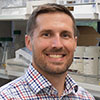
Assistant Professor, Department of Microbiology, Immunology, and Pathology
I joined CSU in 2021 with a joint appointment in MIP and the Fort Collins campus of the CU Anschutz School of Medicine where I teach in a combination of graduate and medical courses. I have been studying and teaching in the field of microbial pathogens and infectious diseases for over 10 years. My goal as a teacher is to facilitate an interactive and engaging classroom environment and, and in so doing, help students think like the scientists and medical professionals they will become. I encourage students to engage in critical thinking and creative problem-solving skills using real-life situations, and I encourage classroom interaction using collaboration and incorporating open-ended discussions into traditional didactic lectures. My goal is for students to be able to utilize and apply their individual talents to solve tomorrow’s problems.
Educational Background
Research
My research interests are in bacterial pathogenesis and innate immunity, and my current laboratory work is focused on the molecular mechanisms of Staphylococcus aureus biofilm formation and medical device-associated infections. The goal of my research is to further our understanding of biofilm-mediated infection development and associated innate immune responses with the long-term goal of developing novel strategies to prevent and treat device-associated S. aureus infections.
Areas of Interest
Bacteriology, biofilms, infectious diseases, innate immunology, microscopy

Biosafety Director and Responsible Official,
Vice President for Research, Colorado State University
Joint Academic & Administrative Associate, Department of Microbiology, Immunology, and Pathology
I have been with Colorado State University (CSU) since September 2020. Prior to my time at CSU, I was at the University of Wisconsin-Madison where I worked as a researcher, then a biosafety and biosecurity professional. My career in biosafety and biosecurity has spanned over a decade in which I have been a part of variety of unique circumstances including many reactive and proactive science communication outreach activities. I am enjoying the opportunity to teach and share my experiences and thoughts about biosafety and biosecurity with students. My hope is that the students take what they learn and apply it in their careers helping to create safer and more secure scientists. I thoroughly enjoy discussing science and learning about research projects and data.
Educational Background
Research
The Biosafety Office at CSU is interested in conducting basic biosafety research to better inform future risk assessments as well as gain a greater understanding of the risks of new technologies and organisms. We are also looking at ways of enhancing biosecurity practices in the scientific community both internally and externally to CSU.
Areas of Interest
Biosafety, Biosecurity, Dual Use Research of Concern, Science Communication
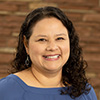
Assistant Professor, Department of Microbiology, Immunology, and Pathology
I have been with the Department of Microbiology, Immunology, and Pathology since 2007. During my research appointments in the Department, I’ve found teaching and mentoring fascinating. I’ve taught dozens of undergraduates, graduates, and post-docs to conduct bioassays, molecular biology techniques and analysis. I enjoy empowering students with laboratory and analytical tools that will be useful in their professional or academic careers. The course's purpose is to introduce students to the cell and molecular biology required to understand the current and fascinating research in infectious diseases. The purpose is to offer students with a thorough appreciation of themes in molecular biology that will help them advance in their chosen career fields of basic research, science communication, biotechnology, or medicine.
Educational Background
Research
I am an Assistant Professor located at Colorado State University's Center for Vector-Borne Infectious Diseases on the Foothills campus. My laboratory investigates the biology of mosquitoes that transmit arboviral diseases to humans. I am particularly interested in the molecular mechanisms of insecticide resistance, as well as their evolution, and interactions with biological features that affect virus replication and transmission. To understand the molecular pathways in resistant mosquitos, I use toxicology, genetics, genomics, transcriptomics, and metabolomics. My purpose is to give information and tools that will help to improve global mosquito control tactics and prevent disease transmission.
Areas of Interest
Mosquito biology, toxicology of insecticides, genetic, genomics

Instructor, Department of Microbiology, Immunology, and Pathology
The world has changed a great deal in the last few years, and I am passionate about ensuring that online graduate education prepares the next generation of Microbiologists to meet it. I have experience in teaching graduate level courses in an online format and strive to make these classes as impactful as any classical graduate level course. I am a firm believer that “doing” is learning and incorporate practical applications of topics into my sessions. I strive to teach Microbiology in a way that incorporates theoretical, experimental, and computational concepts so that students become well rounded scientists.
Educational Background
Research
I am an expert on the molecular physiology and metabolism of nitrifying bacteria and archaea, with an emphasis on studying these microbial populations in agricultural soils. My research interests at Colorado State University are highly varied and I have several ongoing collaborations. Some of these include characterizing the microbiome of endemic biting midges, understanding necessary protein structures in viral infection, and determining gene expression in biofilm formation. In general, I am excited to apply my expertise in environmental microbiology and archaeal physiology in novel systems.
Areas of Interest
Bioinformatics, Microbial Ecology, Microbial Symbiosis, Archaea
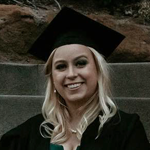
"I was attracted to the wide range of backgrounds of the faculty and the flexible online model. During the program, I was exposed to many fields and occupations that led me to opportunities I didn’t even know existed. I apply things I learned every day in my job when I set up laboratories and train scientists in diagnosing pathogens in patients. The quality of education is beyond what I expected. Professors were extremely supportive and dedicated to student success."
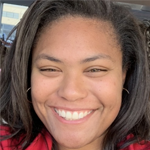
"The biggest draw to CSU Online was the elite professors. They are actively engaged in research and doing the science you read about in textbooks. Many of the techniques I learned in the program are a vital part of my everyday work as a research associate. I would absolutely recommend this program. The education I received is unparalleled."
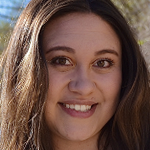
"When I saw I could complete a Masters in Microbiology in a year, there wasn't much debate. The program was highly recommended for its amazing classes, supportive professors, and professional development. I developed passions I had no idea I had and explored other aspects of myself, professionally and personally. I currently work as a Study Pathology Technician at Labcorp aiding in the preclinical stages of drug development for the health of animals and people. I learned about drug development in the program through classes and pathology through guest speakers, leading me to my decision to apply to a pathology related job. This program changed my professional and personal growth in ways I never imagined. The world of microbiology is vast and versatile, explore it, advocate for it, and contribute to it!"
| Fall semester | June 15 |
| Spring semester | November 1 |
Start your application online and upload materials directly into the online system. You can save your progress and return any time.
Apply NowNote: Meeting the minimum department standards does not ensure admission to the program.
Prepare the materials below and upload when you apply online:
Three letters of recommendation (required): Recommenders should accurately speak to your abilities and potential for graduate study. You will provide information about your recommenders in the online application. CSU will contact them with instructions and a link to a secure form they will submit on your behalf.
Complete the online graduate application and pay the nonrefundable application processing fee (payable online). As soon as you have completed the required information, please submit your application. Your application will not be reviewed until it is complete and all required materials have been received.
Online applications must be submitted before 5 p.m. (Mountain Time) on the deadline date.
Request one official transcript of all collegiate work completed from all institutions attended. Transcripts from Colorado State University are not required. Transcripts must be received directly from the originating institution to be considered official.
Electronic (preferred): Digital Transcripts must be submitted by the originating institution using a secure service such as parchment, eScrip-Safe, the National Student Clearinghouse, or e-Quals. Transcripts received via emails are considered unofficial. Use institution code 4075 for Colorado State University or gradadmissions@colostate.edu if the secure service requires an email address.
Mail (if necessary) Graduate Admissions Colorado State University – Office of Admissions 1062 Campus Delivery Fort Collins, CO 80523-1062
View your application status at any time to ensure your application checklist is complete or to check on updates.
Once your complete application, including supporting materials, is received, the department admission committee will review your application and notify you of their decision.
Proof of English language proficiency is required for applicants from countries or United States territories where there are official languages other than (or in addition to) English. This includes the U.S. territories of American Samoa, Guam, the Northern Mariana Islands, and Puerto Rico.